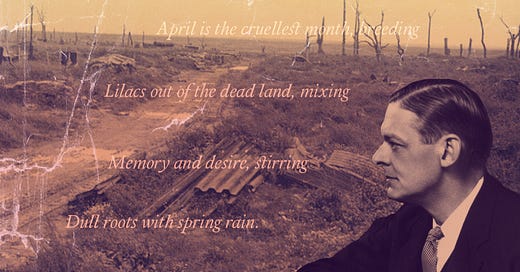Emanuel Litvinoff (1914-2011) was born in Whitechapel, east London to Jewish immigrants who had fled Tsarist pogroms in Odessa. That part of the city saw frequent running battles between Blackshirts and anti-fascists, which erupted even after the war. Anti-Semitism had been endemic in Pre-War British society. Jew-hating insults were later explained away, somewhat shamefacedly, as ‘casual’ or as ‘biblical’ anachronisms which were forgotten. After the Second World War T.S. Eliot, a New England Unitarian turned British Royalist and Anglo-Catholic, republished some of his poems from the 1920s; some of which, like ‘Burbank with a Baedeker: Bleistein with a Cigar’, included expressions of anti-Semitism such as:
The rats are underneath the piles.
The Jew is underneath the lot.
Money in furs. The boatman smiles …
Litvinoff, generally an admirer of Eliot’s greatest poetic achievements, was appalled. In 1951 Litvinoff, a little-known but upcoming writer, was invited to read two poems to a prestigious poetry evening at the Institute of Contemporary Arts (ICA). The event was chaired by anarcho-surrealist Herbert Read who had, surprisingly, just been knighted by King George VI. Litvinoff recalled in a 1998 interview for the Museum of London:
‘Now when I was called to read my poems, I had read the first one, which was absolutely innocuous, and I had just announced the title of the second one, “To T. S. Eliot”, and Herbert Read said: “Oh good, Tom has just come in”. Eliot apparently had arrived with an entourage and I felt dreadful about reading it, I felt very, very nervous and I thought to myself, “Well look, the poem is entitled to be read,” and I read it with a trembling voice that gave it an extraordinary power.’
I am not one accepted in your parish.
Bleistein is my relative and I share
the protozoic slime of Shylock, a page
in Sturmer, and, underneath the cities,
a billet somewhat lower than the rats.
Blood in the sewers. Pieces of our flesh
float with the ordure on the Vistula.
You had a sermon but it was not this.
By the time Litivinoff delivered the final stanzas, he was being hissed and jeered by some in the audience:
…walking with Cohen when the sun exploded
and darkness choked our nostrils,
and the smoke drifting over Treblinka
reeked of the smouldering ashes of children,
I thought what an angry poem
you would have made of it, given the pity…
Let your words
tread lightly on this earth of Europe
lest my people’s bones protest.
Litvinoff recalled:
‘When I finished reading it Herbert Read said to me “If I had known that you were going to read such a poem I would never have allowed it,” and I thought “Eh? And you’re an anarchist?” ‘Then hell broke loose and I remember particularly Stephen Spender getting up and saying: “As a poet as Jewish as Litvinoff, I’m outraged by this unwanted, undeserved attack on my friend T. S. Eliot.”’
Eliot, his head resting on the back of his seat, was heard murmuring to his friends: ‘It’s a good poem, a very good poem.’
Eliot's reaction has been taken by his literary apologists as one of a number of gestures of contrition for his earlier 'sins'. However, Anthony Julius in T.S. Eliot, Anti-Semitism and Literary Form (1995), finds the apologetics unconvincing. Amidst much evidence to the contrary, he refers to a book published in 1936 by Victor Gollancz called The Yellow Spot: the outlawing of half a million human beings, which exposed Nazi persecutions and atrocities meted out on Jews in Germany. The book was trashed by a reviewer in the journal, Horizon, as
'an attempt to rouse moral indignation by means of sensationalism... it does not touch on how we might alleviate the situation of those whose misfortunes it describes, still less on why they, among all the unfortunates of the world, have a first claim on our compassion and help'.
The review was unsigned, but as Eliot was the journal's editor it could be safely assumed that if he didn't actually write it he endorsed and approved it. As Julius points out, the review ‘crawls with impatient distaste’ and wilfully refuses to do its subject justice.
In 1934 Eliot published After Strange Gods: A Primer of Modern Heresy. This referred to reasons of ‘race and religion’ making any large numbers of free-thinking Jews ‘undesirable’. That Eliot never allowed its republication is seen as further evidence for him having repudiated his pre-War views. Also, in 1934, he wrote a pageant play, The Rock, which presents a group of Blackshirts critically. Tom Paulin, reviewing Julius's book in 1996, comments,
'But as Julius shows, the rejection of the Blackshirts’ prejudices is a rejection of anti-Christian paganism. The play is not a plea for modern Jewry – it is an endorsement of Christianity in “both its historical and supernatural forms”... Discussing a footnote on the “illusion” that there can be culture without religion, which Eliot added to the 1948 edition of Notes towards a Definition of Culture, Julius shows that three years after the liberation of the death camps “Eliot has learnt nothing. Too many free-thinking Jews are undesirable; contact between Jews and Christians is undesirable because it fosters a damaging illusion”.’
Paulin continues,
'Eliot’s hostility to his father’s Unitarianism is one of the psychological causes of his hostility to Jews, but I think there is a deeper cultural base for it, in that a certain strain of conservative discourse tends to identify Judaism with Unitarianism and with other forms of Puritanism.'
One source here, referred to by Paulin, is Edmund Burke's Reflections on the Revolution in France (1790), which attacks the Unitarians Richard Price and Joseph Priestley, identifying 'Price’s writings on economics and statistics with Jewish business activities... Unitarianism and Judaism deny the divinity of Christ...'
Indeed they do, as do unbelievers of any stamp: all of which Eliot frowned upon as having no ‘culture’ worthy of nourishment and respect. Today, the apologetics for Eliot's dislike/disapproval of non-religious Jews is eerily echoed through the fog of pro-Israel propaganda in our so-called liberal democracies. ‘Anti-Zionism’ has been added to the list of secular sins assigned to anyone who might break ranks with the police-enforced pro-Israel consensus.
An American Jewish friend who is active in Palestinian solidarity campaigning tells me that people like him are regarded by Zionists – be they centrist liberals, Christian-nationalists, or outright fascists - as the 'worst kind of anti-Semites'.
The centrist liberals are disturbed by the uncomfortable fact that a very large proportion of Jewish people – especially secularised youth – oppose the determination of Netanyahu and his fascist allies, to fight a Forever War with their neighbours.
For ‘Christian Zionism’, which emerged alongside the Ku Klux Klan in late 19th century America, support for Israel is rooted in the Protestant heresy of the ‘End Times’: Jesus will stage a Second Coming at the Temple Mount in Jerusalem following a final battle at Armageddon, which will see the infidels defeated and the Jews converted to Christianity. For Christian nationalism, the genocidal violence in Gaza and the West Bank is to be celebrated rather than condemned.
The strategy of the European Far Right is to support Zionism because it renders the fascist legacy as forgivable and therefore forgettable; and because Israel’s war with the ‘Arabs’ is homologous with Islamophobia and anti-immigrant rhetoric. So is there anything that raises fascist hackles more than the phenomena of radical Jews joining forces with Muslims in the cause of Palestinian self-determination?
REFERENCES
Anthony Julius, in T.S. Eliot, Anti-Semitism and Literary Form
(1995)
Tom Paulin, Review of Julius, London Review of Books, 9 May 1996
Jack Omer-Jackaman, ‘Tread Lightly Lest My People’s Bones Protest: Litvinoff, Eliot, and English Antisemitism’, Jewish Review of Books, Fall 2024





